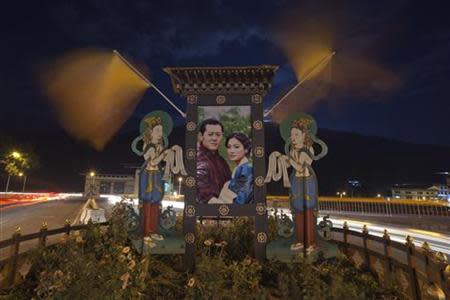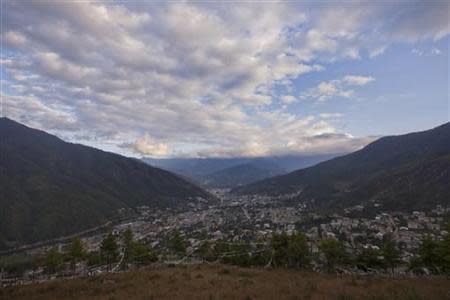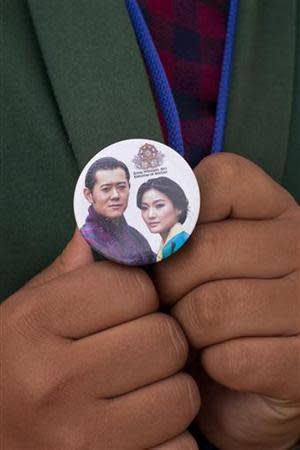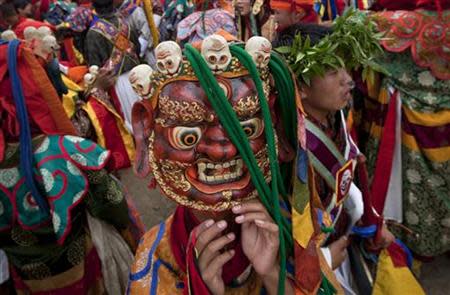In Bhutan's young democracy, a Dragon King comes of age
THIMPHU (Reuters) - The poor Bhutanese farmer stands by the mountainside road, expectant at a royal visit. Dressed in the gho gown worn by most of the people, he lowers his traditional white scarf from his neck and bows as the convoy of 15-20 cars approaches. It is a sign for the handsome, 31-year-old "Dragon King" to stop and listen to the man's grievances. The scene is played out repeatedly across this reclusive Himalayan kingdom of 700,000 people as the popular King Jigme Khesar Namgyel Wangchuck forges a role as guardian of people's rights in a young democracy sandwiched between China and India. By all accounts, he has been enormously successful since formally assuming the throne three years ago. He is now marrying a 21-year-old student, Jetsun Pema, a commoner whose father is an airline pilot. Thursday's Buddhist ceremony in a 17th century fortress of Punakha, Bhutan's ancient capital, should help cement his image as "the people's king" and defender of Bhutan's unique concept of Gross National Happiness -- the idea that social welfare, personal feelings and the environment matter as much as economic growth. "The biggest consideration when choosing the Queen was that the queen did not get in the way of him and his people," said one source close to the king. Wangchuck's father and absolute monarch abdicated in 2006 to bring democracy to its mostly unwilling traditional citizens. But rather than just play a role as constitutional monarch, the new Oxford-educated king has increasingly acted as a check and balance in an unsure democracy, ensuring grievances are channeled to courts or ministries. It is a risky move -- a similar experiment in neighboring Nepal was marked by chaos and abolition of the monarchy. Other Himalayan nations failed to remain independent, China annexed Tibet in 1951 and India absorbed the kingdom of Sikkim in 1975. Bhutan's people have traditionally had a close relationship with their kings, but Wangchuk seems especially adored. His father, the fourth king in a lineage that stretches back a century, married four sisters from a wealthy family. Polygamy is allowed in Bhutan, but many ordinary Bhutanese disliked the former king's in-laws. Rumors abounded of nepotism and an elite clique of well connected royals in a country where more than a fifth of the population lives in poverty on less than $0.70 a day. The new king has jettisoned that reclusive and elitist image. He lives in a cottage in the capital Thimpu, and often invites his subjects for tea. THE GENERATION GAP "He bridges the generation gap. He funnels frustrations" said Tashi Choden, a senior researcher at the Center for Bhutan Studies. "And the marriage will cement the idea of a people's king." Bhutan, which only allowed tourists from the 1970s and introduced television in 1999, is globalizing often slowly and reluctantly. The capital has few traffic lights after residents complained they were unsightly. Its economy of hydro-power and upper-scale tourism needs investment to appease its growing youthful population, eager for modern trappings like mobile phones. An increasingly assertive media -- privately-owned newspapers only appeared from 2006 -- are now attacking the prime minister and his government. But while the new king may have lost absolute power, he has gained prestige. Farmers who would run into the forests rather than personally look at a visiting king in the eyes, now stand by roadsides for his arrival. "He is doing everything his father never did. He is meeting everyone, from taxi drivers to housewives," said Tashi Dorji, editor of Business Bhutan, a privately-owned newspaper that has spearheaded probes into the government. "He is beyond reproach." The king, a keen basketball player, already had the advantage of good looks that made him a poster boy of his own subjects as well thousands of young Thai women after a visit there. His education at Oxford helped him acquire a world outlook, but he has also developed a keen sense of what needs to be done in his homeland. On one of his regular trips in Bhutan, the king's aides typically take down notes when one of his subjects stands by the roadside to ask for an audience. The case -- say a complaint about a local judge -- will be researched by a team of royal secretariat officials who will then take up the case with ministries or the courts. It is an ombudsman-like role that is institutionalized. There are now three regional royal representatives who cover grievances and petitions across Bhutan. The king has other powers. He can grant scarce farming land in a country where farmers make up two thirds of the population, and he helps run disaster prevention. When an earthquake hit the neighboring Indian state of Sikkim last month, the king toured Bhutan's quake-hit regions for weeks, trekking to remote villages. He finished just a week ago -- joking to officials whether he would make it back in time. Now the festivities are starting. Monks are praying. Pictures of him and his wife-to-be adorn the streets. "It can be a lonely on the top," said Business Bhutan in an editorial. "Through this wedlock the heir to the throne will be born. And we pray that it happens sooner than expected." (Editing by Paul de Bendern and Raju Gopalakrishnan)




